(完整版)六年级英语一般现在时讲解加练习
完整版)小学一般现在时讲解及练习题
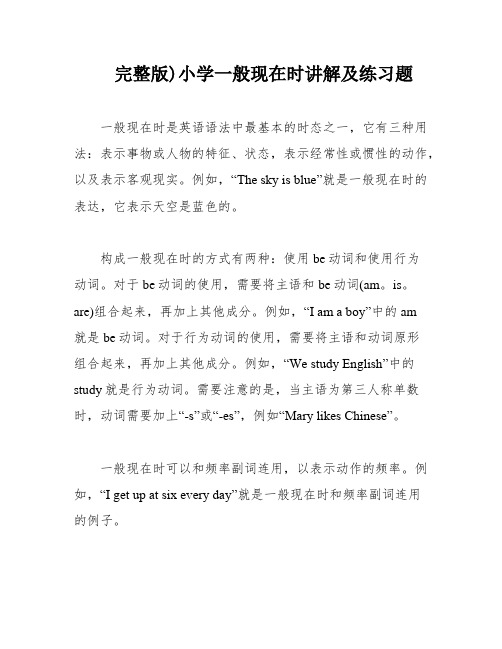
完整版)小学一般现在时讲解及练习题一般现在时是英语语法中最基本的时态之一,它有三种用法:表示事物或人物的特征、状态,表示经常性或惯性的动作,以及表示客观现实。
例如,“The sky is blue”就是一般现在时的表达,它表示天空是蓝色的。
构成一般现在时的方式有两种:使用be动词和使用行为动词。
对于be动词的使用,需要将主语和be动词(am。
is。
are)组合起来,再加上其他成分。
例如,“I am a boy”中的am就是be动词。
对于行为动词的使用,需要将主语和动词原形组合起来,再加上其他成分。
例如,“We study English”中的study就是行为动词。
需要注意的是,当主语为第三人称单数时,动词需要加上“-s”或“-es”,例如“Mary likes Chinese”。
一般现在时可以和频率副词连用,以表示动作的频率。
例如,“I get up at six every day”就是一般现在时和频率副词连用的例子。
一般现在时还可以用于构成否定句、一般疑问句和特殊疑问句。
对于be动词的否定句,需要在be动词后面加上not。
例如,“He is not a worker”就是be动词的否定句。
对于行为动词的否定句,需要在主语和动词原形之间加上don't或doesn't。
例如,“I don't like bread”和“He doesn't often play”就是行为动词的否定句。
对于一般疑问句,需要将be动词或do/does放在主语前面。
例如,“Are you a student?”就是一般疑问句。
对于特殊疑问句,需要在疑问词后面加上一般疑问句。
例如,“Where is my bike?”就是特殊疑问句。
需要注意的是,当主语为第三人称单数时,否定句和一般疑问句需要用doesn't,而不是don't或do。
例如,“He doesn't often play”和“Does she go to work by bike?”就是主语为第三人称单数时的否定句和一般疑问句。
(完整版)一般现在时和特殊疑问句讲解及练习
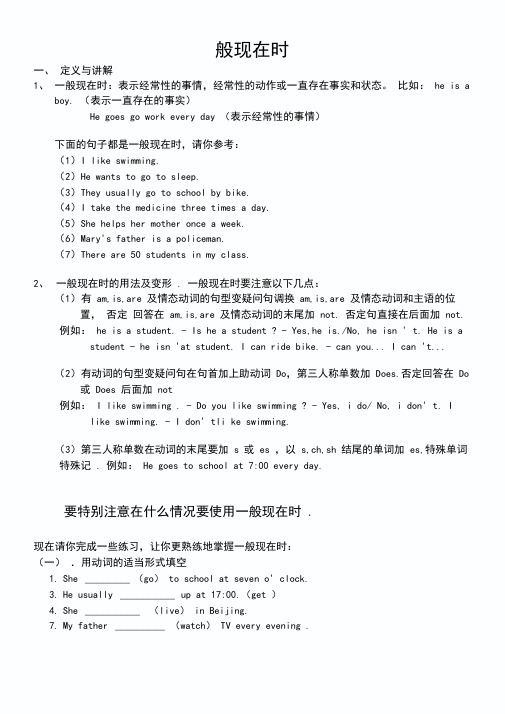
般现在时一、定义与讲解1、一般现在时:表示经常性的事情,经常性的动作或一直存在事实和状态。
比如:he is aboy. (表示一直存在的事实)He goes go work every day (表示经常性的事情)下面的句子都是一般现在时,请你参考:(1)I like swimming.(2)He wants to go to sleep.(3)They usually go to school by bike.(4)I take the medicine three times a day.(5)She helps her mother once a week.(6)Mary's father is a policeman.(7)There are 50 students in my class.2、一般现在时的用法及变形. 一般现在时要注意以下几点:(1)有am,is,are 及情态动词的句型变疑问句调换am,is,are 及情态动词和主语的位置,否定回答在am,is,are 及情态动词的末尾加not. 否定句直接在后面加not.例如:he is a student. - Is he a student ? - Yes,he is./No, he isn ' t. He is a student - he isn 'at student. I can ride bike. - can you... I can 't...(2)有动词的句型变疑问句在句首加上助动词Do,第三人称单数加Does.否定回答在Do 或Does 后面加not例如:I like swimming . - Do you like swimming ? - Yes, i do/ No, i don' t. I like swimming. - I don' tli ke swimming.(3)第三人称单数在动词的末尾要加s 或es ,以s,ch,sh 结尾的单词加es,特殊单词特殊记. 例如:He goes to school at 7:00 every day.要特别注意在什么情况要使用一般现在时 .现在请你完成一些练习,让你更熟练地掌握一般现在时:(一).用动词的适当形式填空1.She _________ (go) to school at seven o' clock.3.He usually ___________ up at 17:00.(get )4.She ___________ (live) in Beijing.7.My father __________ (watch) TV every evening .9. _______ Amy __________ (read) English every day10. Chen Jie sometimes __________ (go)to the park with her sister.二).选择填空1.I want _ h omework now.A. doingB. to doC. to do myD. do my2.It's time __ .A. go to schoolB. play gamesC. to go homeD. to do my homeworks 3.go and helpher.A. Let's meB. Let's usC. Let'sD. Let's to4.Do they have a new car? Yes, ____ .A .they are B.they have C. they don't D. they do5.He often _______ supper at 6:00 in the evening.A. haveB. has c. is having D. is eating6.We ______________ any Chinese classes on Friday.A. are havingB. aren 'th avingC. don'th aveD. are have三)、用括号内动词的适当形式填空。
(完整版)一般现在时态讲解及练习(精简版,错题版)

一般现在时态一、一般现在时的用法1)表示经常性、习惯性的动作或存在的状态。
通常与副词sometimes, often, usually, always, every day (year, month ), once (twice, three times) a day,等等频率副词(时间状语)连用。
e。
g。
They usually go to school by bike。
I take the medicine three times a day. 实义动词表示“动作”She helps her mother once a week.Mary’s father is a policeman.There are 50 students in my class. Be动词表示“状态”He is very busy now。
be 、do不能放一起,如果非要放一起,do后要加ing, 变成现在进行时。
2) 表示主语的特征、性格、爱好等。
e.g。
I work hard.I like watching TV.3) 表示客观真理e。
g. There are seven days in a week.The moon moves round the earth。
The sun rises in the east and sets in the west every day。
Tomorrow is Tuesday。
二、一般现在时的句子转换:三、一般现在时的结构:“主语+谓语+其它”,有时为了起强调作用,时间状语也可提前.三单变化:1)多数在动词后+s :play - plays like —likes ask———asks work———works get---gets stay-——stays2)以字母s, x, ch, sh或o结尾的动词,+-es:watch-——watches wish———wishes fix———fixes do——-d oes go---goes pass-—-passes3)以“辅音字母加 - y”结尾的动词,要先变y为i+-es。
小学六年级上册英语时态精讲练习
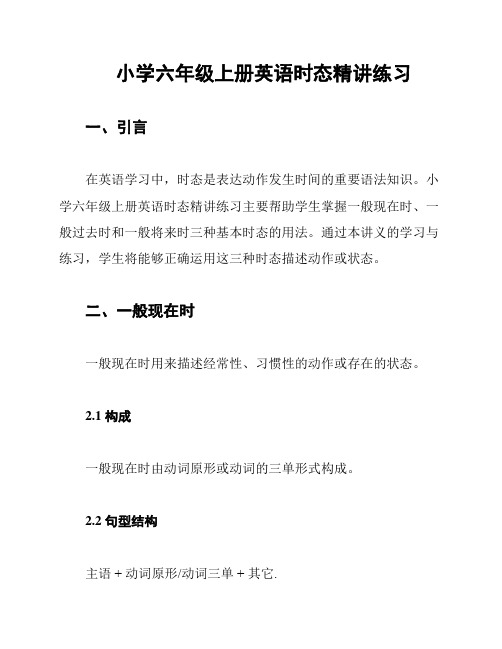
小学六年级上册英语时态精讲练习一、引言在英语学习中,时态是表达动作发生时间的重要语法知识。
小学六年级上册英语时态精讲练习主要帮助学生掌握一般现在时、一般过去时和一般将来时三种基本时态的用法。
通过本讲义的学习与练习,学生将能够正确运用这三种时态描述动作或状态。
二、一般现在时一般现在时用来描述经常性、习惯性的动作或存在的状态。
2.1 构成一般现在时由动词原形或动词的三单形式构成。
2.2 句型结构主语 + 动词原形/动词三单 + 其它.2.3 练习1. I (eat)_____ breakfast every morning.2. She (go)_____ to school by bus.3. The cat (sleep)_____ on the sofa.三、一般过去时一般过去时用来描述过去发生的动作或存在的状态。
3.1 构成一般过去时由动词的过去式构成。
3.2 句型结构主语 + 动词过去式 + 其它.3.3 练习1. I (watch)_____ a movie yesterday.2. She (visit)_____ her grandparents last week.3. They (play)_____ soccer in the park.四、一般将来时一般将来时用来描述将来要发生的动作或存在的状态。
4.1 构成一般将来时有两种构成方式:will + 动词原形和 be going to + 动词原形。
4.2 句型结构1. 主语 + will + 动词原形 + 其它.2. 主语 + be going to + 动词原形 + 其它.4.3 练习1. I (buy)_____ a new bike next month.2. She (travel)_____ to Japan with her family.3. They (move)_____ to a new house in two years.五、总结通过本讲义的学习与练习,学生应掌握一般现在时、一般过去时和一般将来时三种基本时态的构成、句型结构和用法。
(完整版)小学英语一般现在时三单动词的变化规则及练习题

一般现在时三单动词的变化规则及练习题1.一般情况下,直接加-s 2.以s. x. sh. ch. o结尾,加-es 3.以“辅音字母+y”结尾,变y为i,再加-es一、写出下列动词的第三人称单数drink ________ go _______ stay ________ make ________ look _________ have_______ pass_______ carry ____ come________ watch______sing_______ fly ________ study_______ brush________ do_________ teach_______二、用括号内动词的适当形式填空。
1. He often ________(have) dinner at home.2. Daniel and Tommy_______(be) in Class One. 3. We _______(not watch) TV on Monday. 4. Nick _______(not go) to the zoo on Sunday.5. What _______they often _______(do) on Sundays?6. _______ your mother _______(read) newspapers every day?7. Mike _______(like) cooking. 8. I _______(be) ill. I’m in bed. 9. Liu Tao _______(do) not like PE. 10. The child often_______(watch) TV in the evening.三、按照要求改写句子1. He watches TV every evening.(改为否定句)___________________________________________________2. I do my homework every day.(改为一般疑问句,作否定回答) ________________________________________________3. She likes books.(改为一般疑问句,做肯定回答)_______________________________________________________4. Amy likes playing computer games.(改为一般疑问句,作否定回答)________________________________________________________5. We go to school on Sundays.(改为否定句)_______________________________________________________四、改错(划出错误的地方,将正确的写在横线上)1. Is your brother like English? __________________2. Does he likes swimming? __________________3. He likes play games. __________________4. Shedon’tdo her homework on Sundays. _________________五、把句子补充完整。
小升初语法辨析一般现在时一般过去时一般将来时(讲义)人教PEP版英语六年级下册

小升初英语语法辨析:一般现在时、一般过去时、一般将来时&专项模拟练习一、一般现在时1.定义:表示经常发生的动作、存在的状态或普遍真理。
2.时间标志词:often(经常)、usually(通常)、always(总是)、sometimes(有时)、every day/week/month/year(每天/ 周/ 月/ 年)等。
3.结构:1.主语(非第三人称单数)+ 动词原形。
例如:You play basketball afterschool.(你放学后打篮球。
)2.主语(第三人称单数)+ 动词的第三人称单数形式。
例如:He playsbasketball after school.(他放学后打篮球。
)4.用法:1.表示经常性或习惯性的动作。
如:I go to school by bike every day.(我每天骑自行车去上学。
)2.表示现在的状态或特征。
如:She is tall and thin.(她又高又瘦。
)3.表示客观事实或普遍真理。
如:The earth moves around the sun.(地球绕着太阳转。
)二、一般过去时1.定义:表示过去某个时间发生的动作或存在的状态。
2.时间标志词:yesterday(昨天)、last week/month/year(上周/ 上个月/ 去年)、ago(……以前)、in + 过去的年份等。
3.结构:主语+ 动词的过去式。
例如:You played basketball yesterday.(你昨天打了篮球。
)4.用法:1.表示过去某个时间发生的动作。
如:I went to the park last Sunday.(我上周日去了公园。
)2.表示过去存在的状态。
如:He was happy yesterday.(他昨天很开心。
)三、一般将来时1.定义:表示将来某个时间要发生的动作或存在的状态。
2.时间标志词:tomorrow(明天)、next week/month/year(下周/ 下个月/ 明年)、in the future(在未来)等。
一般现在时知识讲解与专项练习(讲义)-人教PEP版英语六年级上册

六年级上册一般现在时知识讲解与专项练习一、一般现在时知识点【No. 1】概念:1.表不事物或人物的特征、状态。
如:The sky is blue.天空是蓝色的。
2.表示经常性或习惯性的动作。
如:I get up at six every day.我每天六点起床。
3.表示客观现实。
如:The earth goes around the sun.地球绕着太阳转。
【No.2】时间标志性词:every ... (every day/week/Sunday...)on+星期几(on Mondays/Tuesdays..)频度副词(always, usually often sometimes, rarely, seldom, never)【No.3】结构:①动词原形I like apples.②动词单三形式He plays football.③be动词I am a boy.有be无动(动:实义动词)①肯定句:主语+be+其他He is an English teacher.②否定句:主语+be not+其他He is not an English teacher.③一般疑问句:Be +主语+其他+...?Is he an English teacher?有动无be(动:实义动词)①肯定句:主语(非三单)+动词原形+其他I play football.主语(三单)+动词三单形式+其他He plays football.②否定句:主语(非三单)+don’t+动词原形+其他I don't play football.主语(三单)+doesn’t动词原形+其他He doesn't play football.③一般疑问句:Do+主语(非三单)+动词原形+其他?Do you play football?Does+主语(三单)+动词原形+其他?①肯定形式:主语十情态动词can/may+动词原形+宾语。
人教版(PEP)英语六年级下册语法练习 一般现在时概念及练习汇总
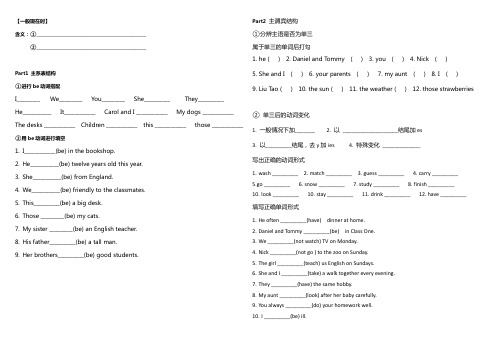
【一般现在时】含义:①_________________________________________________②_________________________________________________Part1 主系表结构①进行be动词搭配I_________ We_________ You_________ She__________ They__________He___________ It____________ Carol and I ____________ My dogs ____________ The desks ____________ Children ____________ this ____________ those ____________②用be动词进行填空1.I____________(be) in the bookshop.2.He___________(be) twelve years old this year.3.She___________(be) from England.4.We___________(be) friendly to the classmates.5.This__________(be) a big desk.6.Those _________(be) my cats.7.My sister _________(be) an English teacher.8.His father__________(be) a tall man.9.Her brothers__________(be) good students. Part2主谓宾结构①分辨主语是否为单三属于单三的单词后打勾1.he ( )2. Daniel and Tommy ( )3. you ( )4. Nick ( )5.She and I ( )6. your parents ( )7. my aunt ( )8. I ( )9.Liu Tao ( ) 10. the sun ( ) 11. the weather ( ) 12. those strawberries② 单三后的动词变化1. 一般情况下加_______2. 以___________________结尾加es3. 以_________结尾,去y加ies4. 特殊变化_____________写出正确的动词形式1.wash _________2. match _________3. guess _________4. carry _________5.go _________6. snow _________7. study _________8. finish _________10.look _________ 10. stay _________ 11. drink _________ 12. have _________填写正确单词形式1.He often _________(have) dinner at home.2.Daniel and Tommy _________(be) in Class One.3.We _________(not watch) TV on Monday.4.Nick _________(not go ) to the zoo on Sunday.5.The girl _________(teach) us English on Sundays.6.She and I _________(take) a walk together every evening.7.They _________(have) the same hobby.8.My aunt _________(look) after her baby carefully.9.You always _________(do) your homework well.10.I _________(be) ill.按要求进行句型改写1.Daniel watches TV every evening. (改为否定句)_____________________________________________________________________________ 2.I do my homework everyday. (改为一般疑问句,并做否定回答)_____________________________________________________________________________ 3.She likes going skating. (改为一般疑问句,并作肯定回答)_____________________________________________________________________________ 4.He speaks English very well.(改为否定句)_____________________________________________________________________________ 5.Jerry and Lisa’s home is near the park. (改为否定句)_____________________________________________________________________________正确单词及句式进行填空1._______ the desk _______ (have) four legs? Yes, it does.2._______ she _______ (do) her homework everyday? Yes, she does.3._______ he _______ (live) in Huanggang? No, he doesn’t.4.Does Danny _______ (see) the apple tree? Yes,she does.5._______ she _______ (come) from America? No, she doesn’t.6.What _______ they often _______ (do) on Sundays?7._______ your parents _______ (read)newspapers everyday?8.We ______________ (not watch) TV on Monday.9.Nick ______________ (not go) to the zoo on Sunday.10.The black birds ______________ (not be) in the tree. 对划线部分进行提问1.John comes from Canada._____________________________________________________________________________ 2.I take photos in the park._____________________________________________________________________________ 3.Jackie runs every evening._____________________________________________________________________________ 4.I always dance in the park._____________________________________________________________________________ 5.Simon and Daniel go skating every winter._____________________________________________________________________________改正错误(画出错误的地方,将正确的改写在横线上)1.Is your brother speak English?____________________________________________________2.Does he likes going fishing?____________________________________________________3.He likes play games after class.___________________________________________________4.Mr.Wu teachs us English.____________________________________________________5.She don’t do her homework on Sundays.___________________________________________6.The twins usually have rice for lunch. ____________________________________________7.They usually goes to bed at 9 o’clock._____________________________________________8.Where is he come from?____________________________________________________9.My father often listen to the radio in the evening.____________________________________10.What do you in the evening do?________________________________________________11.What’s the weather likes in spring?_______________________________________________。
(完整版)小学英语四种时态知识点加练习

小学英语四种时态知识点加练习一、一般现在时一. 意义:表示经常发生的事情,动作或存在的状态二. 构成及变化1.be动词的变化。
肯定句:主语+be(am,is,are)+其它。
如:I am a boy.我是一个男孩。
否定句:主语+ be + not +其它。
如:He is not a worker.他不是工人。
一般疑问句:Be +主语+其它。
如:-Are you a student? -Yes. I am. / No, I'm not.特殊疑问句:疑问词+一般疑问句。
如:Where is my bike?2. 行为动词的变化。
l、当主语为第一,二人称及复数时,助动词为do肯定句:主语+动词原形(+其它)。
如:We often play basketball after school.否定句:主语+ don't+动词原形(+其它)。
如:we don’t play basketball after school.一般疑问句:Do +主语+动词原形+其它?如:Do you often play basketball after school? Yes, we do. / No, we don't.特殊疑问句:疑问词+以do开头的一般疑问句?如:What do you often do after school ?2、当主语为第三人称单数时,助动词为does肯定句:主语+动词三单式(+其它)。
如:He swims well.否定句:主语+ doesn’t+动词原形(+其它)。
如:He doesn’t swim well..一般疑问句:Does +主语+动词原形+其它。
如:Does he swim well ?Yes, he does. / No, he doesn't.特殊疑问句:疑问词+以does开头的一般疑问句?如:How does your father go to work?三.第三人称单数的动词变化规则(只有在第三人称为主语的肯定句中,动词才用三单式)(1)多数动词直接加s: runs gets likes collets takes plays climbs…….(2)结尾是s, x, sh, ch, o,前为辅音字母, 结尾加es :watches teaches goes does washes crosses mixes brushes(3)动词末尾y前为辅音:将y改为i加es: study→studies fly→flies carry→carries cry→cries但在y前如果为元音则直接加s:buys says四.时间标志:always , usually , often , sometimes ,every…一般现在时练习题I.用下列单词的适当形式填空1.We often___________(play) in the playground.2.He _________(get) up at six o’clock.3.__________you _________(brush) your teeth every morning?4.What________________(do) he usually________________(do) after school?5.Danny ________________(study) English, Chinese, maths, science and Art at school.6.Mike sometimes __________(go) to the park with his sister.7.At eight at night, she __________(watch) TV with his parents.8.________ Mike________(read) English every day?9.How many lessons_________your classmates________(have) on Monday?10.What time_________his mother_________(do) the housework?II.改句子1.Do you often play football after school? (改为肯定句)2.I have many books.(改为否定句)3.Gao Shan’s sister likes playing table tennis (改为否定句)4.She lives in a small town near New York.(改为一般疑问句)5.I watch TV every day.(改为一般疑问句)6.We have four lessons.(改为否定句)7.Nancy doesn’t run fast (改为肯定句)二、现在进行时一、概念现在进行时表示说话时正在进行或发生的动作,也可表示当前一段时间内的活动或现阶段正在进行的动作。
六年级英语一般现在时练习题30题带答案解析

六年级英语一般现在时练习题30题带答案解析1.She often____books in the library.A.readB.readsC.readingD.to read答案解析:B。
主语she 是第三人称单数,often 表示一般现在时,动词要用第三人称单数形式reads。
A 选项read 是动词原形;C 选项reading 是现在分词;D 选项to read 是动词不定式。
2.He____basketball after school.A.playB.playsC.playingD.to play答案解析:B。
主语he 是第三人称单数,after school 表示一般现在时,动词要用第三人称单数形式plays。
A 选项play 是动词原形;C 选项playing 是现在分词;D 选项to play 是动词不定式。
3.My sister____to music every day.A.listenB.listensC.listeningD.to listen答案解析:B。
主语my sister 是第三人称单数,every day 表示一般现在时,动词要用第三人称单数形式listens。
A 选项listen 是动词原形;C 选项listening 是现在分词;D 选项to listen 是动词不定式。
4.The boy____his homework carefully.A.doB.doesC.doingD.to do答案解析:B。
主语the boy 是第三人称单数,carefully 不影响时态,一般现在时动词要用第三人称单数形式does。
A 选项do 是动词原形;C 选项doing 是现在分词;D 选项to do 是动词不定式。
5.Tom____up early in the morning.A.getB.getsC.gettingD.to get答案解析:B。
主语Tom 是第三人称单数,in the morning 表示一般现在时,动词要用第三人称单数形式gets。
(完整版)一般现在时练习题含答案解析
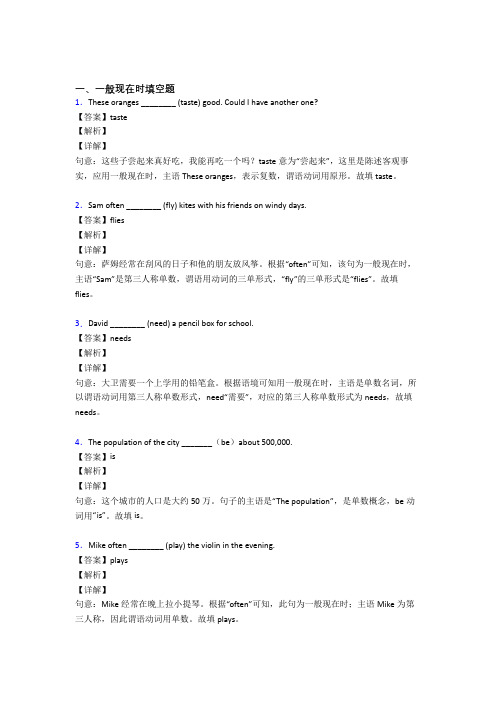
一、一般现在时填空题1.These oranges ________ (taste) good. Could I have another one?【答案】taste【解析】【详解】句意:这些子尝起来真好吃,我能再吃一个吗?taste意为“尝起来”,这里是陈述客观事实,应用一般现在时,主语These oranges,表示复数,谓语动词用原形。
故填taste。
2.Sam often ________ (fly) kites with his friends on windy days.【答案】flies【解析】【详解】句意:萨姆经常在刮风的日子和他的朋友放风筝。
根据“often”可知,该句为一般现在时,主语“Sam”是第三人称单数,谓语用动词的三单形式,“fly”的三单形式是“flies”。
故填flies。
3.David ________ (need) a pencil box for school.【答案】needs【解析】【详解】句意:大卫需要一个上学用的铅笔盒。
根据语境可知用一般现在时,主语是单数名词,所以谓语动词用第三人称单数形式,need“需要”,对应的第三人称单数形式为needs,故填needs。
4.The population of the city _______(be)about 500,000.【答案】is【解析】【详解】句意:这个城市的人口是大约50万。
句子的主语是“The population”,是单数概念,be动词用“is”。
故填is。
5.Mike often ________ (play) the violin in the evening.【答案】plays【解析】【详解】句意:Mike经常在晚上拉小提琴。
根据“often”可知,此句为一般现在时;主语Mike为第三人称,因此谓语动词用单数。
故填plays。
6.My cousin _______ (love) dogs.【答案】loves【解析】【详解】句意:我表弟热爱狗。
小学英语六年级总复习四种十时态的结构和标志词语法讲解及基础练习
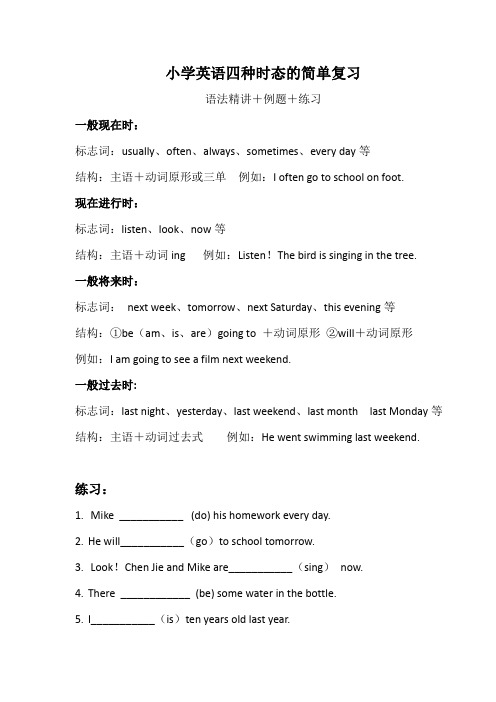
小学英语四种时态的简单复习语法精讲+例题+练习一般现在时:标志词:usually、often、always、sometimes、every day等结构:主语+动词原形或三单例如:I often go to school on foot.现在进行时:标志词:listen、look、now等结构:主语+动词ing 例如:Listen!The bird is singing in the tree.一般将来时:标志词:next week、tomorrow、next Saturday、this evening等结构:①be(am、is、are)going to +动词原形②will+动词原形例如:I am going to see a film next weekend.一般过去时:标志词:last night、yesterday、last weekend、last month last Monday等结构:主语+动词过去式例如:He went swimming last weekend.练习:1. Mike ___________ (do) his homework every day.2.He will___________(go)to school tomorrow.3. Look!Chen Jie and Mike are___________(sing)now.4.There ____________ (be) some water in the bottle.5.I___________(is)ten years old last year.6. We like ____________ (play) basketball after class.7.He___________(ride)a bike with his friend next week.8.My brother is___________(make)kites.9.They___________(do)their homework yesterday.10.We___________(take)a trip over the summer holiday.11. I like singing. I often ____________ (listen) to the music in the evening.12. My grandma ___________ (watch) TV every day.13.Mike didn’t___________(see)a film last night.14.What______you ______ ______ ______ (do)next Saturday.15.Is he___________(watch)TV ?Yes,they are.。
一般现在时的概念及例句(讲义)-人教PEP版英语六年级上册
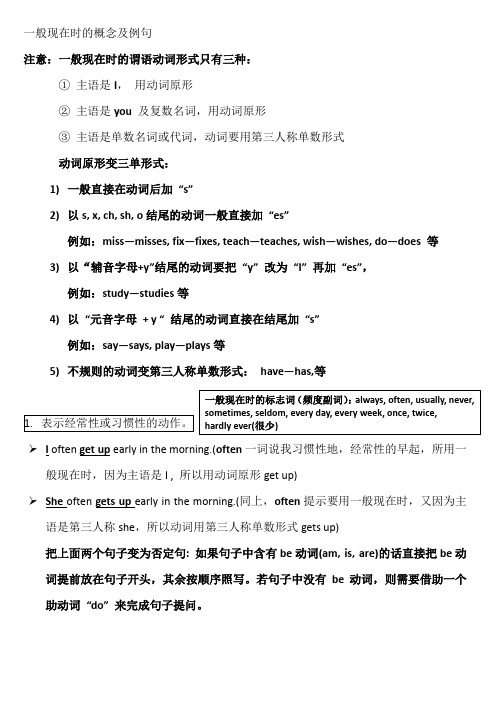
一般现在时的概念及例句注意:一般现在时的谓语动词形式只有三种:① 主语是I , 用动词原形② 主语是you 及复数名词,用动词原形③ 主语是单数名词或代词,动词要用第三人称单数形式动词原形变三单形式:1) 一般直接在动词后加 “s”2) 以s, x, ch, sh, o 结尾的动词一般直接加 “es”例如:miss—misses, fix—fixes, teach—teaches, wish—wishes, do—does 等3) 以“辅音字母+y”结尾的动词要把 “y” 改为 “I” 再加 “es”,例如:study—studies 等4) 以 “元音字母 + y “ 结尾的动词直接在结尾加 “s”例如:say—says, play—plays 等5) 不规则的动词变第三人称单数形式: have—has,等➢ I often get up early in the morning.(often 一词说我习惯性地,经常性的早起,所用一般现在时,因为主语是I , 所以用动词原形get up)➢ She often gets up early in the morning.(同上,often 提示要用一般现在时,又因为主语是第三人称she ,所以动词用第三人称单数形式gets up)把上面两个句子变为否定句: 如果句子中含有be 动词(am, is, are)的话直接把be 动词提前放在句子开头,其余按顺序照写。
若句子中没有be 动词,则需要借助一个助动词 “do” 来完成句子提问。
I often get up early in the morning.→Do you often get up early in the morning?(这里需要注意,如果主语是“I” 的肯定句变成疑问句主语要变成“you” )She often gets up early in the morning.→Does she often get up early in the morning.(这里需要注意的是,如果主语是第三人称名词或代词的话,助动词do要变成动词的第三人称单数形式does,否定形式为does not=doesn’t. 此时真正实义动词(get up)保留原形)2.表示长期存在的特征或状态。
六年级下册英语 一般现在时语法详解 练习(word,含答案) 译林版
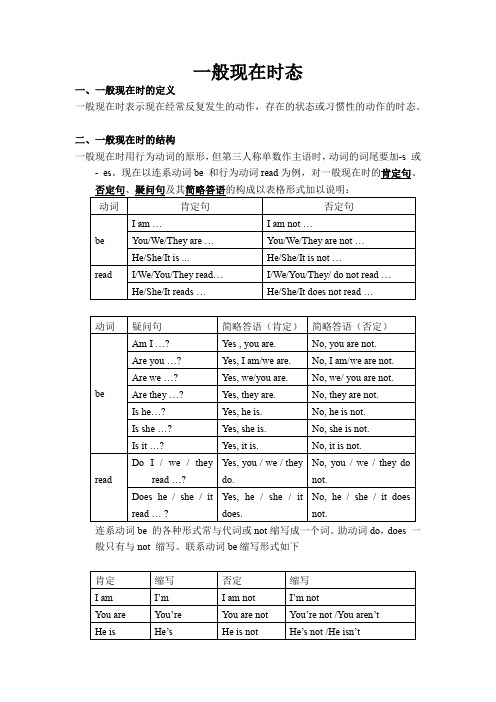
一般现在时态一、一般现在时的定义一般现在时表示现在经常反复发生的动作,存在的状态或习惯性的动作的时态。
二、一般现在时的结构一般现在时用行为动词的原形,但第三人称单数作主语时,动词的词尾要加-s 或-es。
现在以连系动词be 和行为动词read为例,对一般现在时的肯定句、连系动词be 的各种形式常与代词或not缩写成一个词。
助动词do,does 一般只有与not 缩写。
联系动词be缩写形式如下动词do not 的缩写形式为don’t,does not 的缩写形式为doesn’t。
三、动词加-s 或-es (动词第三人称单数)当主语是第三人称单数时,谓语动词需加-s 或-es1.一般在词尾加–s例:work—works leave --- leaves swim --- swims2.以字母s,x,ch,sh 或o结尾的词加-es例:pass--- passes fix ---fixes teach --- teaches do--- does 3.以辅音字母加y结尾的词,先变y为i再加-es例:study --- studies carry --- carries fly --- flies cry --- cries四、一般现在时的用法4.表示经常或习惯性的动作。
常与often(经常), always(总是), sometimes (有时), every day(每天), on Sundays/Mondays 等表示频度的时间状语连用。
一般现在时的时间状语有:today, often, sometimes, always, usually, every day ( week, month, year,…) , this year, once a week ( month, year,…) 一周(月,年)一次例句:I get up at 6 o’clock every day.He often goes to school by bike.5.表示客观事实,普遍真理。
小升初语法讲解一般现在时专题训练(讲义)牛津译林版英语六年级下册

小升初语法讲解一般现在时专题训练(讲义)牛津译林版英语六年级下册知识点讲解一般现在时:1. 一般现在时构成形式:sb. do/ does; sb. is/ am/ are2. 一般现在时用法:1). 表示经常的或习惯性的动作,常与表示频度的副词连用。
常用的频度副词有:always、often、usually、sometimes频度副词在句中通常放在行为动词之前,系动词、助动词之后。
如:He often goes to the cinema2). 表示现在的状态。
例:Mother is ill.3) 表示主语具备的性格、特征和能力等。
例:He sings well.4). 表示客观真理,客观存在,自然现象。
例:The earth turns around the sun.5). 表示按计划或安排好的,或将要发生的动作,可用一般现在时表将来。
但只限于start, begin, leave, go, e, arrive, return, take place等。
例:My train leaves at 7:00 this morning.6). 在复合句中,当主句是一般将来时,时间或条件状语从句的谓语动词只能用一般现在时来表示将来要发生的动作。
If it rains tomorrow, we won’t go there.3. 第三人称单数变化规律:1). 一般情况下,动词直接在结尾加s. Eg.: help helps, play plays2). 以s, x, ch, sh, o结尾的动词,在后面加es. Eg.: brush brushes, go goes, teach teaches3). 以辅音字母+y结尾的动词,把y变为i加es. Eg.: study studies, try tries4. 相关句型1). 一般疑问句:Is/ Are +主语…? Do/ Does +主语+动词原形…?2). 否定句:主语+am /is/ are +not… 主语+do/ does not +动词原形…精选精练一、选择题1.He often ______ to the zoo. ()A.go B.visits C.goes2.Helen ______ early every day. But she ______ late this morning. ()A.gets up; was B.get up; is C.got up; was 3.—Look! There ______ a lot of honey and drinks here. I like them. ()—Me, too.A.was B.is C.has4.Eric’s neck _______. He _______ sleep well at night. ()A.hurt; can’t B.hurts; can’t C.hurts; can5.John usually __________ to bed early. But he __________ to bed late yesterday. () A.go; went B.goes; went C.goes; go6.Sam brings some water quickly and __________ it __________ the hole. () A.pour; to B.pours; into C.pour; into7.—How ______ Tim feel now?()—He ______ hungry.A.do; feels B.does; feel C.does; feels8.Many years ago, Lily ________ to work. But now she usually ________ the metro to work. ()A.walked; takes B.walked; took C.walks; takes9.Lily ________ in New York last year. She ________ in Beijing now. () A.was; is B.were; are C.were; was10.I ______ a white sweater, but my friend Helen ______. ()A.have; don’t B.has; doesn’t C.have; doesn’t 11.—What ______ your sister have? ()—She ______ a new puter.A.does; have B.do; has C.does; has12.Tom ______a toy dog. His friends ______ two. ()A.have; has B.has; have C.have; have13.My grandpa often ______ with me ______ the Internet. ()A.chat; on B.chatting; in C.chats; on14.It’s time to tell a story. Each student _______ one sentence. ()A.say B.says C.saying15.My uncle and aunt ___________ in Shanghai, but my cousin ___________ in Nantong. ()A.live; lives B.live; live C.lives; lives16.We ______ some bread for lunch, but there ______ any bread in my bag now. () A.brought; is B.brought; was C.brought; isn’t D.brought; wasn’t 17.Listen, Su Hai ______. She ______ every morning. She likes ______. () A.is singing; sing; singing B.is singing; sings; singing C.sing; sings; singing 18.Today is Monday. Boys and girls ______ at 7:30 in the morning. ()A.go to school B.go home C.go to bed 19.—Who ______ near City Library? ()—Su Hai and Su Yang ______.A.lives; do B.live; do C.lives; does 20.—What ______ Kitty often do on Sundays? ()—She often ______ kites in the park.A.do; flies B.does; fly C.does; flies 21.Those new shoes ________ my brother. ()A.is to B.is of C.are for22.I ______ an ice cream. Mike ______ a hot dog. ()A.have; have B.has; has C.have; has23.She _____ sweets every day. ()A.make B.makes C.making24.She ______ to be an ______. ()A.want; astronaut B.will; pianist C.wants; astronaut 25.They like ______, but she ______. ()A.dancing; doesn’t B.dancing; can’t C.dancing; likes二、填空题参考答案:1.C【详解】句意:他经常去动物园。
(完整版)一般现在时练习题含答案解析

(完整版)一般现在时练习题含答案解析一、一般现在时填空题1.Your mother ________ (look) young very much.【答案】looks【解析】【详解】句意:你的妈妈看起来非常年轻。
根据“Your mother...young very much.”可知,本题的时态为一般现在时。
主语为Your mother,所以应用looks。
故填looks。
2.The experiment he devoted himself to ________ a perfect success. (prove)【答案】proved##proves【解析】【详解】句意:他致力于的实验证明是圆满成功的。
此处在句中作谓语,“证明”这一动作发生在过去或现在均可,主语是The experiment,动词使用动词过去式或动词三单。
故填proved/proves。
3.________ (be) there any bookshops in my street?【答案】Are【解析】【分析】【详解】句意:我这条街上有书店吗?此处描述客观事实,时态用一般现在时,“bookshops”为复数,be动词应用are,放句首首字母要大写。
故填Are。
4.Lucy __________ (have) a basketball game each year.【答案】has【解析】【详解】句意:露西每年有一场篮球比赛。
have有,是动词,根据句中的 each year可知句子时态用一般现在时,主语Lucy是第三人称单数形式,所以谓语动词也要用第三人称单数形式,故填has。
5.The apple juice in the cups _________(taste) very good.【答案】tastes【解析】【详解】句意:杯子里的苹果汁味道很好。
本句主语是The apple juice,in the cups是修饰The applejuice的,主语是不可数名词,单数,可知谓语动词使用单数形式;结合句意和所给词(taste:尝起来,感官系动词)提示可知填tastes。
(完整版)旅游一般现在时讲解及练习题
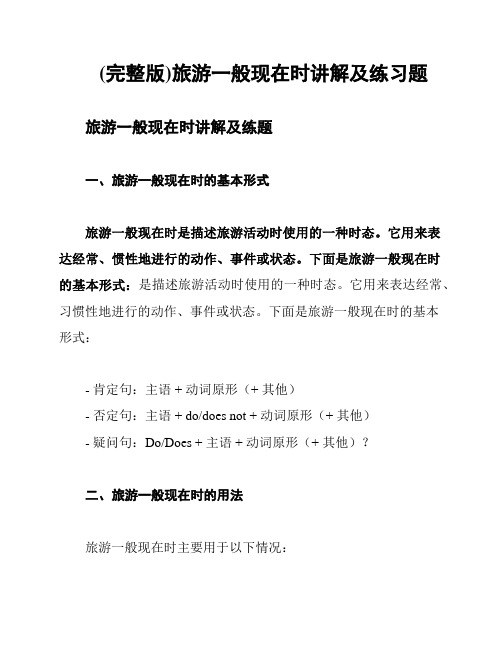
(完整版)旅游一般现在时讲解及练习题旅游一般现在时讲解及练题一、旅游一般现在时的基本形式旅游一般现在时是描述旅游活动时使用的一种时态。
它用来表达经常、惯性地进行的动作、事件或状态。
下面是旅游一般现在时的基本形式:是描述旅游活动时使用的一种时态。
它用来表达经常、习惯性地进行的动作、事件或状态。
下面是旅游一般现在时的基本形式:- 肯定句:主语 + 动词原形(+ 其他)- 否定句:主语 + do/does not + 动词原形(+ 其他)- 疑问句:Do/Does + 主语 + 动词原形(+ 其他)?二、旅游一般现在时的用法旅游一般现在时主要用于以下情况:1. 描述旅游日常活动:如 "I visit famous landmarks"(我参观著名景点)。
2. 谈论旅游经验:如 "I often take photos for memories"(我经常拍照留念)。
3. 分享旅游偏好:如 "She loves trying local cuisine"(她喜欢尝试当地美食)。
4. 表达旅游计划:如 "We leave for the beach tomorrow"(我们明天去海滩)。
三、旅游一般现在时讲解练题请用所给动词的适当形式填空:1. My parents __________(visit) museums whenever they travel.2. We usually __________(stay) in hotels during our vacations.3. She __________(enjoy) hiking in the mountains.4. They __________(take) lots of pictures to capture the beautiful scenery.5. How often __________(you/go) on trips with your friends?6. The tour guide __________(provide) interesting information about the historical sites.7. I __________(not/like) to fly, so I prefer traveling by train.8. Sarah often __________(buy) souvenirs as gifts for her family.答案:1. My parents visit museums whenever they travel.2. We usually stay in hotels during our vacations.3. She enjoys hiking in the mountains.4. They take lots of pictures to capture the beautiful scenery.5. How often do you go on trips with your friends?6. The tour guide provides interesting information about the historical sites.7. I do not like to fly, so I prefer traveling by train.8. Sarah often buys souvenirs as gifts for her family.四、总结旅游一般现在时让我们能够用简单的时态来描述旅游活动。
(完整版)一般现在时练习题附答案解析
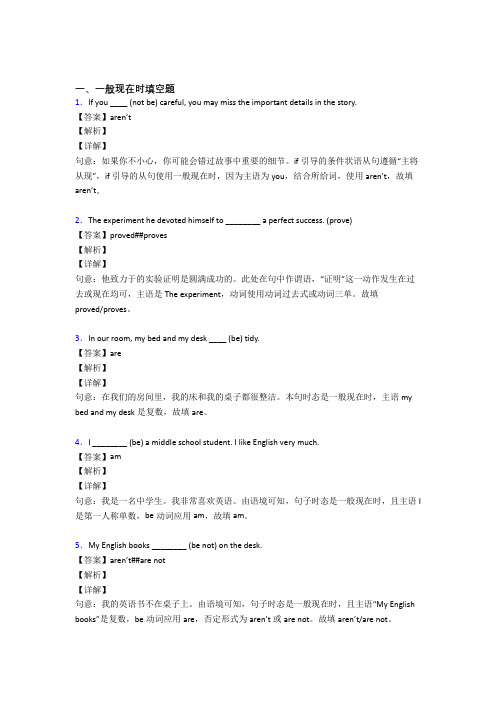
一、一般现在时填空题1.If you ____ (not be) careful, you may miss the important details in the story.【答案】aren’t【解析】【详解】句意:如果你不小心,你可能会错过故事中重要的细节。
if引导的条件状语从句遵循“主将从现”,if引导的从句使用一般现在时,因为主语为you,结合所给词,使用aren’t,故填aren’t。
2.The experiment he devoted himself to ________ a perfect success. (prove)【答案】proved##proves【解析】【详解】句意:他致力于的实验证明是圆满成功的。
此处在句中作谓语,“证明”这一动作发生在过去或现在均可,主语是The experiment,动词使用动词过去式或动词三单。
故填proved/proves。
3.In our room, my bed and my desk ____ (be) tidy.【答案】are【解析】【详解】句意:在我们的房间里,我的床和我的桌子都很整洁。
本句时态是一般现在时,主语my bed and my desk是复数,故填are。
4.I ________ (be) a middle school student. I like English very much.【答案】am【解析】【详解】句意:我是一名中学生。
我非常喜欢英语。
由语境可知,句子时态是一般现在时,且主语I 是第一人称单数,be动词应用am,故填am。
5.My English books ________ (be not) on the desk.【答案】aren’t##are not【解析】【详解】句意:我的英语书不在桌子上。
由语境可知,句子时态是一般现在时,且主语“My English books”是复数,be动词应用are,否定形式为aren’t或are not。
(完整版)英语一般现在时练习题及答案
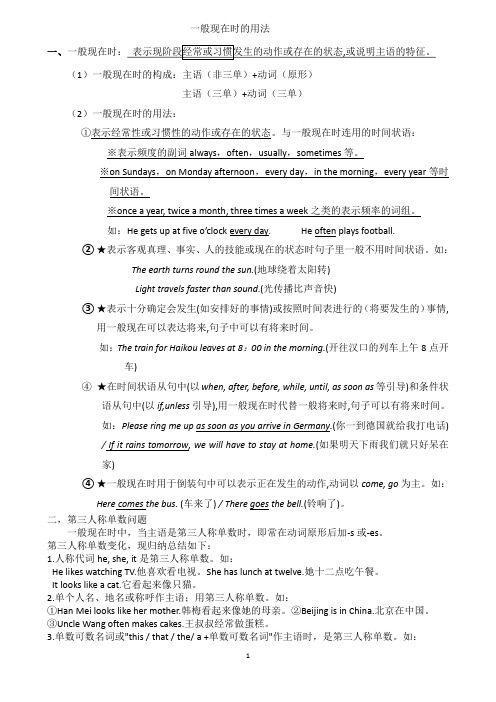
一般现在时的用法一、一般现在时:表示现阶段经常或习惯发生的动作或存在的状态,或说明主语的特征。
(1)一般现在时的构成:主语(非三单)+动词(原形)主语(三单)+动词(三单)(2)一般现在时的用法:①表示经常性或习惯性的动作或存在的状态。
与一般现在时连用的时间状语:※表示频度的副词always,often,usually,sometimes等。
※on Sundays,on Monday afternoon,every day,in the morning,every year等时间状语。
※once a year, twice a month, three times a week之类的表示频率的词组。
如:He gets up at five o’clock every day. He often plays football.②★表示客观真理、事实、人的技能或现在的状态时句子里一般不用时间状语。
如:The earth turns round the sun.(地球绕着太阳转)Light travels faster than sound.(光传播比声音快)③★表示十分确定会发生(如安排好的事情)或按照时间表进行的(将要发生的)事情,用一般现在可以表达将来,句子中可以有将来时间。
如:The train for Haikou leaves at 8:00 in the morning.(开往汉口的列车上午8点开车)④★在时间状语从句中(以when, after, before, while, until, as soon as等引导)和条件状语从句中(以if,unless引导),用一般现在时代替一般将来时,句子可以有将来时间。
如:Please ring me up as soon as you arrive in Germany.(你一到德国就给我打电话)/ If it rains tomorrow, we will have to stay at home.(如果明天下雨我们就只好呆在家)④★一般现在时用于倒装句中可以表示正在发生的动作,动词以come, go为主。
(完整版)一般现在时练习题及答案解析

一、一般现在时填空题1.Wednesday_________(come) after Tuesday.【答案】comes【解析】【详解】句意:星期三是在星期二之后。
本题说的是客观真理,因此用一般现在时。
Wednesday为单数,因此谓语用三单形式。
故答案为comes。
2.Many kids ________ (在……有困难) getting along with their parents nowadays.【答案】have trouble##have problems##have difficulty【解析】【详解】句意:现在很多孩子与父母相处有困难。
“在……有困难”为have trouble/problems/difficulty doing sth.。
本句为一般现在时,主语many kid是复数,动词have使用原形。
故填have trouble/problems/difficulty。
3.It often ________(snow)here in winter. Look! It is ________(snow)again.【答案】 snows snowing【解析】【详解】句意:这里冬天经常下雪。
看!又下雪了。
由often可知,第一空所在句子为一般现在时,主语是It是第三人称单数形式,故动词应用单三式snows;根据空前“Look!”可知,第二空所在句子为现在进行时,构成形式为:be doing;snow的现在分词是snowing。
故填snows;snowing。
4.Linda __________ (exercise) every morning, so she is very healthy.【答案】exercises【解析】【详解】句意:琳达每天早上锻炼,所以她很健康。
根据时间状语“every morning”可知,句子是一般现在时,主语是第三人称单数形式,故动词应用单三式exercises。
- 1、下载文档前请自行甄别文档内容的完整性,平台不提供额外的编辑、内容补充、找答案等附加服务。
- 2、"仅部分预览"的文档,不可在线预览部分如存在完整性等问题,可反馈申请退款(可完整预览的文档不适用该条件!)。
- 3、如文档侵犯您的权益,请联系客服反馈,我们会尽快为您处理(人工客服工作时间:9:00-18:30)。
一般现在时一般现在时的定义:表示经常性的事情,经常性的动作或一般性事实。
一般现在时的标志词:often 经常,usually通常,always 总是,every每个,sometimes 有时一般现在时的结构:只有在主语是第三人称单数时动词发生“三单变化”,其他用动词的原形。
三单变化:1.多数在动词后+s play — plays like — likes(1)直接在动词词尾加-s.ask---asks work---works get---gets stay---stays(2)以字母s, x, ch, sh或o结尾的动词,在词尾直接加-es.watch---watches wish---wishes fix---fixes do---doesgo---goes pass---passes(3)以“辅音字母加- y”结尾的动词,要先变y为i再加-es.try---tries study---studies cry---cries fly---flies2.不规则变化:be---- is are have----has二、一般现在时用法1. 表示经常性,习惯性,永久性的动作或存在的状态.通常与副词sometimes, often, usually, always, every day (year, month ), once (twice, three times) a day,等时间状语连用。
They usually go to school by bike.I take the medicine three times a day.She helps her mother once a week.Mary’s father is a policeman.There are 50 students in my class.2. 表示客观真理,科学原理,自然现象,等客观事实或格言,谚语等。
The sun rises in the east and sets in the west every day.The man who has never been to the Great Wall is not a real man.Tomorrow is Tuesday.三、一般现在时的句子转换:(1)当句子中有be动词或情态动词时,则把be动词或情态动词(can,could 等等)提到主语的前面变成疑问句;在be动词或情态动词后面加not变成否定句.例:①陈述句:She is a student.疑问句→ Is she a student?否定句→ She is not a student.①陈述句:I can swim.疑问句→ Can you swim否定句→ I can not swim.(2)当句子中即没有be动词,也没有情态动词时,则在主语前加助动词do (you,以及复数), does(单数she,he,it)变成问句;在主语后谓语动词前加助动词don’t(I,you,以及复数), doesn’t(单数she,he,it)变成否定句,助动词后的动词要变成动词原形。
例:①陈述句:We get up at 7:00 every morning.疑问句→Do you get up at 7:00 every morning?否定句→We don’t get up at 7:00 every morning.①陈述句:She has a little brother.疑问句→ Does she have a little brother?否定句→ She doesn’t have a little brother.(一).用动词的适当形式填空1. She _________(go) to school at seven o’clock.2. He usually ___________ up at 17:00.(get )3. She ___________ (live) in Beijing.4. My father __________ (watch) TV every evening.5.________ Amy _________ (read) English every day?6. Chen Jie sometimes _________(go)to the park with her sister.(二).选择填空7.I want____homework now. A. doing B. to do C. to do my D. do my 8.It's time______.A. go to schoolB. play gamesC. to go homeD. to do my homework 9.______go and help her. A. Let's me B. Let's us C. Let's D. Let's to 10.Do they have a new car? Yes,_____.A .they are B.they have C. they don't D. they do11.He often _________ supper at 6:00 in the evening.A. haveB. has c. is having D. is eating12. We _____________ any Chinese classes on Friday.A. are havingB. aren’t havingC. don’t haveD. are have(三)、用括号内动词的适当形式填空。
13. He often _________ (have) dinner at home.14. Daniel and Tommy _________ (be) in Class One.15. We _________ (not watch) TV on Monday.16. Nick_________ (not go) to the zoo on Sunday.17. _________they _________ (like) the World Cup?18. What _________ they often_________ (do) on Saturdays?19. _________your parents _________ (read) newspapers every day?20. The girl _________ (teach) us English on Sundays.21. She and I _________ (take) a walk together every evening.22. There _________ (be) some water in the bottle.23. Mike_________ (like) cooking.24. They _________ (have) the same hobby.25. My aunt _________ (look) after her baby carefully.26. You always _________ (do) your homework well.27. I _________ (be) ill. I’m staying in bed.28. She _________ (go) to school from Monday to Friday.29. Liu Tao _________ (do) not like PE.30. The child often _________ (watch) TV in the evening.31. Wang Kai and Wang li_________ (have) eight lessons this term.32. -What day _________ (be) it today?-It’s Saturday.33.We often___________(play) in the playgound.34.He _________(get) up at six o’clock.35. __________you _________(brush) your teeth every morning.36. What __________(do) he usually _________ (do) after school?37. Danny__________(study) English,Chinese,Maths,Science and Art an school.38. Mike sometimes __________(go) to the park with his sister39. At eight at night, she __________(watch) TV with his parents.40. ________ Mike________(read) English every day?41. How many lessons_________your classmate________(have) on Monday?42.What time_________his mother_________(do) the housework?43. Do you often play football after school? (肯定回答)______________________________________________________44. I have many books.(改为否定句)______________________________________________________45. Gao Shan’s sister likes playing table tennis (改为否定句)______________________________________________________46. She lives in a small town near New York.(改为一般疑问句)______________________________________________________47. I watch TV every day. (改为一般疑问句)______________________________________________________48. David has got a goal. (改为一般疑问句)______________________________________________________49. We have four lessons.(否定句)______________________________________________________50. Nancy doesn’t run fast (肯定句)______________________________________________________51.My dog runs fast.一般疑问句:__________________________________________否定句:__________________________________________52.Mike has two letters for him.一般疑问句:__________________________________________否定句:__________________________________________53.I usually play football on Friday afternoon.否定句:__________________________________________一般疑问句:__________________________________________划线提问:__________________________________________ 54.Su Yang usually washes some clothes on Saturday.否定句:__________________________________________一般疑问句:__________________________________________划线提问:__________________________________________ 55.Mingming usually waters the flowers every day否定句:__________________________________________一般疑问句:__________________________________________划线提问__________________________________________ 56.Tom does his homework at home.否定句:__________________________________________一般疑问句:__________________________________________划线提问__________________________________________。
